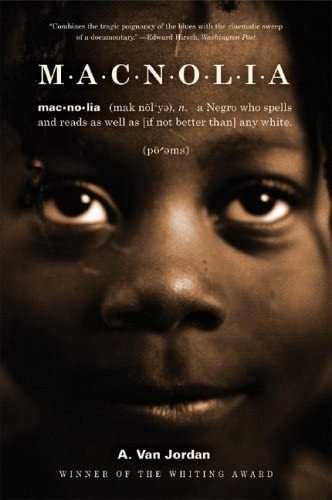I’ve learned so much from M-A-C-N-O-L-I-A by A. Van Jordan. In this beautiful and devastating book, Jordan demonstrates how to chronicle a life, a history, and a generation’s loves, triumphs, losses, and griefs through a polyphony of voices and forms. At its core, the collection examines the life of MacNolia Cox in reverse, beginning with an elderly woman on her deathbed and ending with a child competing on the stage of the National Spelling Bee.
Told through the voices of MacNolia herself, her husband John, son Darrell, and employer Dr. Wittenberg, among legends such as Jesse Owens, Richard Pryor, and Josephine Baker, Jordan carefully assembles not only MacNolia’s life but also that of the time period in which she lived. By juxtaposing the MacNolia narrative poems with snapshots of historical figures, M-A-C-N-O-L-I-A considers the ways in which racism shaped Black daily existence and one individual’s life’s trajectory. Thus, M-A-C-N-O-L-I-A is not only a story of one disenchanted woman or crushed little girl; it is the story of a generation.
Jordan pushes me to think about how language impacts history, meaning, and people’s lived experiences. Scattered throughout the collection are dictionary poems, wherein the poet simultaneously breaks down the definition of a word and extends the book’s overarching narrative through sample sentences.
with (=) prep. 1. against: It started in the fall of 1950, a fight with my husband John. He could not accept my being pregnant. … 5. As regards, toward: John is not a patient man. And I wondered: could he show patience with children? … 9. Because of, through: I could tell John was going to be blue with pride, especially if we had a boy– … 10. Despite: Even with all his earlier protests, he kept a smile on his face when our son, Darrell, was born.
Here, Jordan complicates the most basic building blocks of syntax. Words that we take for granted (i.e. “from,” “with,” “to”) come under the poet’s scrutiny and cannot be passed over. He reveals how a preposition as simple as “with” contains multiple opposites–to mean both toward and against; because of and despite–which, when illuminated, disrupts meaning and demands that I look more closely. Throughout the book, Jordan shows how chance encounters, moments, and words can upend a life. Nothing is static; words, people, and history are dynamic and exist in relationship to each other and a larger context.
The poet writes: “Sometimes you learn words / By living them and sometimes / Words learn you” (“Infidelity”). This is a powerful suite of poems that will break your heart.




